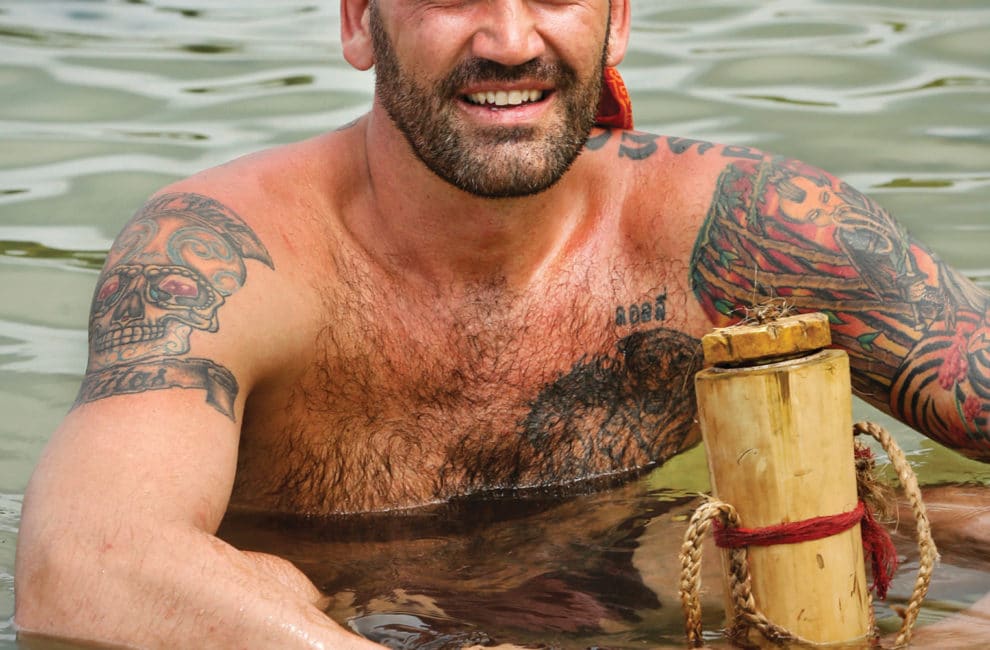
AMA: Scot Pollard
Correction: When this story was originally posted online, it incorrectly stated that Scot Pollard obtained full custody of the children following his divorce. According to court documents, the divorced couple share joint legal custody of their children and, per the most recent information available to IM, share equal parenting time. IM regrets the error. The Ask Me Anything Q&A has been updated accordingly.
Editor’s Note: Carmel resident Scot Pollard was voted out 10 weeks into his run on Survivor in one of the most brutal blindsides and betrayals in the show’s 32 seasons. He’ll go down as one of the show’s better villains, having rubbed other contestants the wrong way by wrecking havoc around camp in retaliation for votes against his allies. As one columnist put it, for fans Pollard’s elimination was as satisfying as the most-hated player on a rival basketball team fouling out. But Pollard took his loss in stride, showing no bitterness immediately afterward—a veteran move that might redeem his reputation enough to earn an invitation to play again, as Survivor heavily casts returners these days. For now, though, he remains on the show’s online “Ponderosa” series about life at the camp where voted-out contestants stay until the game is over. This interview with Pollard for our May issue, out on newsstands soon, was conducted earlier this year.
You were paid pretty handsomely during your NBA career, but have said you went on Survivor primarily for the money. Why?
People see that I made $38 million in my career and they immediately assume you’re worth that. Fifty percent of that is gone to taxes. So now you’re down to $17 or $18 million. Four percent goes to your agent. You have to live. And there are legal expenses. You’ve got your financial advisor that takes a percentage of everything you invest. It chips away. There’s a 90 percent post-retirement divorce rate for NBA players, and I got divorced.
Several athletes who have appeared on the show tried to conceal their identity. Why didn’t you?
I had a feeling that one or two of my castmates recognized me on the way out there. I thought, I’m not going to hide it, I’m going to own it. I wanted to see if people would treat me fairly or if they would say, ‘Screw him, he’s an athlete, he’s got money, he’s out.’ I had no desire to hide who I was. And at 6’11” and with tattoos, they were going to assume I’m an athlete of some sort anyway.
Is it harder to make it through an NBA season or a Survivor season?
Being hungry and being thirsty are mental challenges; it’s a physical toll on your body, but that didn’t bother me as much as it bothered other people. An NBA season is harder to get through. It’s longer, there is more sleep deprivation. On Survivor, you know the end date—it’s 39 days. It’s a short-term sacrifice for a big goal. You can make lots of money in the NBA—and they take care of you—but a season lasts eight to nine months every year. That’s a long time to sacrifice your body, your sleep, your diet.
Did you practice survival skills beforehand? Was there anything you could draw on from basketball?
I did try to make a fire in the backyard once, and I didn’t have success then either. You could consider being on different NBA teams similar to being in a tribe on Survivor, where you don’t necessarily like everyone. In the NBA, you can’t choose who you share a locker room with.
Did that basketball background hurt you or help?
It helps to have experience in a team sport because early on, you’ve got to get far enough to where it becomes an individual game. If you’re not a good team player, you’re going to get voted out early.
Rupert Boneham is one of the most experienced Survivor contestants to date. Did the local have any advice for you?
I’ve met him on several occasions but didn’t get any advice from him. He never won because he was too much of a target, so I learned from him just by seeing him on the show.
You sparred with a Twitter troll who wrote that you played Survivor even worse than basketball. Did that bother you?
Ninety-nine percent of the feedback has been positive. A lot of people are surprised that I’m playing well. But there are always others who are not fans, and that was true during my NBA career as well. There were hecklers who said I didn’t deserve to be in the league. For them, I always had the same response: “I’m one of 450 in the world playing in the NBA—what do you do for a living? Thanks for buying a ticket. Thanks for making me rich.”
You’ve done a little acting. Was playing a sadistic, ax-wielding maniac in the horror film Axeman at Cutter’s Creek a stretch for you?
It was pretty easy. There weren’t many lines. It was just me looking big and scary. It was very cathartic because we filmed it right after my divorce. I fake-killed somebody and started laughing. They had to edit that out.
You’ve said you enjoyed flipping the switch to become a “cold-blooded bastard.” Why?
Everyone has different elements of their personality. Some people block out the positive elements of their personality and dwell in negativity, others do the opposite. I’ve made mistakes in my life. I’ve always been a great father, but I wasn’t a great husband the first time around. I’m a better man now. I’m a great husband now and a great father.





